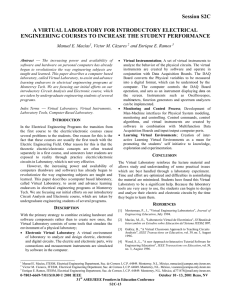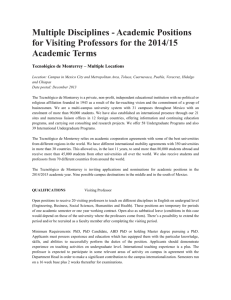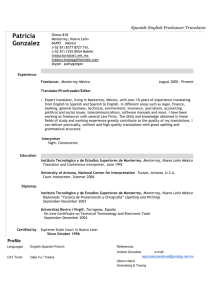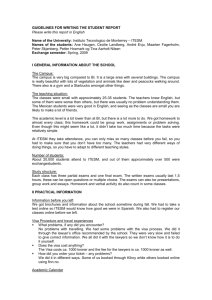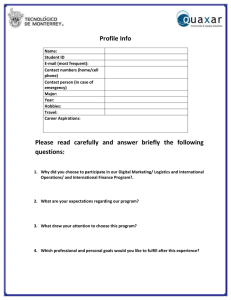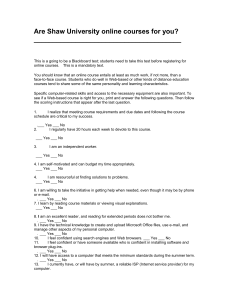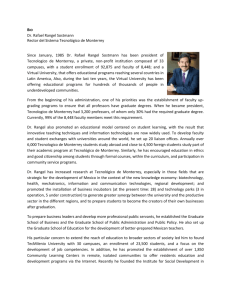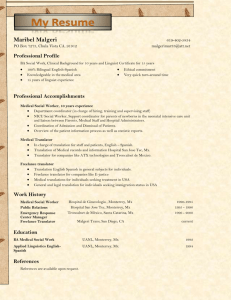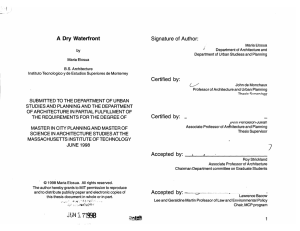The Impact of Web-based Experiments in Teaching at Tec de
advertisement
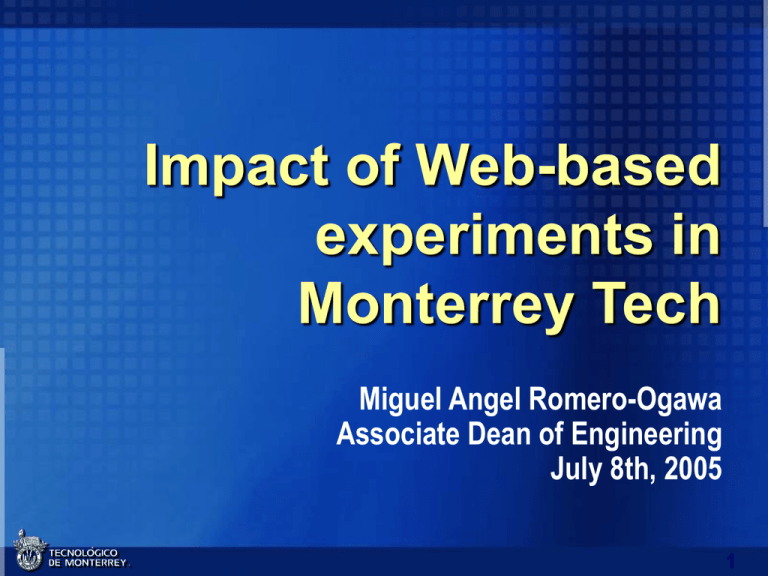
Impact of Web-based experiments in Monterrey Tech Miguel Angel Romero-Ogawa Associate Dean of Engineering July 8th, 2005 1 Monterrey Tech Privately funded Non-profit Independent Non government operational support 27 non-profit sponsoring organizations 567 trustees 2 Monterrey Tech 33 campuses 8,253 faculty 96,832 students Tec Milenio 6 campuses 870 faculty 8,611 students Virtual University 5,804 students 3 Texas Florida South Carolina Arizona Guatemala El Salvador Nicaragua Costa Rica Panama Honduras Colombia Venezuela Peru Ecuador Chile Bolivia Virtual University 2004 Programs 1. Graduate Students 5,804 2. Continuing education 30,859 3. Social programs 59,512 4 12 field offices 5 Students abroad: 7,221 (2004) North America 29% Europe 60% Asia 4% South America 4% Oceania 4% 6 Students from other countries: 4,065 (2004) North America 45% Europe 30% Asia 4% South America 20% Oceania 2% 7 Educational model Ethics, attitudes and values Professional Social Leadership international responsability and competitive and humanistic entrepreneurship perspective and life skills International perspective 8 Web-based Experiments Information technology has facilitated the concurrent, collaborative, multidisciplinary development of engineering Major impact areas: Remote process control and monitoring Collaborative distance engineering Distance learning 9 Virtual Laboratory Intelligent Systems Center, Dr. Jose Luis Gordillo Virtual Laboratory generic model and methodology development Interinstitutional project: ITESM (Campus Cuernavaca, Monterrey, Estado de México and México City), UNAM and IPN Funded by the National Council of Science and Technology, 2002 10 Tele Engineering Laboratory Electric Engineering Department, Dr. Manuel Macias Integration of electronic, telecommunication and computing technologies through the development of systems for: Data acquisition, analysis and presentation, Distance process automation and control, Man-Machine Interfaces, Computer Aided Remote Monitoring This course has been offered 4 times (2 years) for mechanical engineering, electrical engineering and computer science programs 11 Automated manufacturing remote system Collaboration project with Esslingen Hochschule für Technik, funded by SIEMENS, using this installation and propietary software. Students are able to perform distance collaborative engineering Run for the first time during the first semester 2005, currently some students of Monterrey Tec are on a summer exchange working on related projects 12 Automation 13 Automation 14 Distribution of the Laboratory 15 Monitoring and Control 16 Portable Virtual Instrumentation 17 Laptop + 18 DAQ-Cards (PCMCIA) + 19 Internet Messenger = Internet 20 Remote Assistance Internet 21 Electric Circuits Course Electrical Engineering Department, Lic. Luis Molina Server containing information regarding 6 experiments: Theory, problems to solve, tutorials for simulation, digital videos, instructions and digital videos regarding access and use of measurement instruments Remote laboratory with server to control and monitor instruments (oscilloscope, multimeter, signal generator and power source) as well as two webcams PC room where students can run simulations 22 Electric Circuits Course Lecture once every other week, problems are discussed, videos regarding a simulation of the remote experiment Students work on exercises and remote experiment on their own (individually or in teams) After a week, students learning is assessed by solving problems and executing remote experiments in teams under the supervision of professor and TA’s Tests have been conducted comparing the performance of traditional taught sections with virtual lab supported sections, the results slightly in favour of the latter http://www.mty.itesm.mx/etie/elearning/circuitos1/index.html 23 Electric Circuits Lab Course Electrical Engineering Department MSc. Luis Molina and MSc. Sergio Malacón Students develop a project that must be remote monitored and controlled Students get lectures and tutorials on the first half of the semester and finish their projects during the second half Virtual-real laboratory with 8 e-learning benches Has been offered for 4 semesters (2 years) 24 Virtual Learning Environments 25 Remote Electronics Lab: Regulated Power Supply 26 Remote Electronics Lab: Bipolar Transistor Amplifier 27 Remote Electronics Lab: Electronic Circuit Design 28 Heat Transfer and Process Control Chemical Engineering and Mechatronics Departments Dr. Vicente Garza and Dr. Rubén Morales Pilot scale tube and shell heat exchanger coupled to a cooling tower Industrial type of instrumentation Used to be operated and controlled by means of an industrial console (Honeywell TDC-3000) In process of renewing hardware systems and industrial console 29 Heat Transfer and Process Control 30 Heat Transfer and Process Control Used in both Chemical Engineering and Mechatronics Department courses offered for the Chemical Engineering undergraduate program: Heat Transfer Operations Unit Operations Lab Process Control Lab Control room is “next door” Not yet web-based, in process of development 31 MIT iLABs project at ITESM Monterrey Tech invited to participate on the iCampus MIT project in 2004 The starting point in this collaborative relation is the iLabs project, due to the fact that some faculty at ITESM has had previous experiences in mounting lab experiments on internet A MOMU was signed, converting ITESM into iCampus Hub Affiliate Institution 32 Opportunities for ITESM Facilitate the implementation of additional web based experiments Use web-based experiments as a teaching aid in the classroom just in time when you need them Use web-based lab experiments as additional activities and homeworks Provide a better lab service to students, especially in courses with out-of-classroom experimental activities and high enrollment. They could carry out experiments almost 24/7 33 Opportunities for ITESM Run inter-campii services, as some of our smaller campii do not have the experimental facilities (freshmen chemistry course for engineering) Opportunity to foster inter-campii collaborative work Divulgate engineering programs among high schools all over México Build collaborative networks with other institutions around web-based experiments (i-Labs) 34 MIT-ITESM iLAB Project Implementation A software support team has been assembled to maintain and operate the service broker and related hardware and software A hardware support team has been assembled to assist professors in the development of web based experiments and MIT’s lab server technology Key personnel of the software support team has spent some time on MIT this summer 35 MIT-ITESM iLAB Project Implementation 3 MIT postgraduate students are currently at Monterrey Tech to assist in the installation, startup and troubleshooting of the service broker Our development teams will be developing interfaces with propietary software such as Siemens and Honeywell Although the main interest is on the interactive architecture, the batch architecture based on our own service broker is due to start next term on some electrical engineering courses and experiments 36 37
